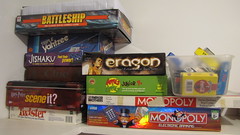Social/Emotional Skills
Children grow every day, both socially and emotionally (see full Glossary). By the time a child reaches kindergarten they are starting to develop a good sense of “who” they are and “what” they can do. How they view themselves, at this age, really depends on how others view them. This is why it is so important that we often tell children how wonderful they are, and how great their achievements are. Children at this age need to be encouraged to try new things. Kindergarten children also love to have some control over their lives. This is because most of what happens to them is completely beyond their control and in the hands of their parents, teachers and caring adults around them. Predictability and routines are extremely important, and changes to routines need to be explained to them ahead of time if possible.
Most kindergarten children can:
- easily spend some time away from their parents, most of the time;
- have “best” friends and “enemies”
- thrive on the attention and approval of adults;
- get easily upset when criticized, as their self-concepts are just starting to get stronger;
- mostly describe themselves in term of physical characteristics (for example, “I am tall and fast”), and are just starting to think of themselves in more qualitative terms (for example, “ I am smart”);
- enjoy playing simple card or board games (Fig. 1);
- follow rules, even without being told, most of the time;
- share with others, even when not prompted to do so, some of the time.
Figure 1: Board games
DID YOU KNOW?
- Children at this age change “best” friends as often as they change clothes. Today’s best friend can easily become tomorrow’s “enemy.” This is a perfectly typical part of growing up, as children are just now starting to make sense of how complex relationships can be.
- They can appear quite bossy at times. This is because they are delighting in the idea that they “know” certain things, and just want to show off this knowledge.
- A child may ask you, over and over again, to read the same story to him or her. Parents are often confused as to why their child wants to hear the exact same story. Children do this for a very specific and important reason. Some of what happens in their lives is not predictable, and most of it is beyond their control. But when you read them a story that they know, they feel very powerful and even safe. They know what will happen next, there are no surprises. This gives them a great sense of security. So, as much as you may dislike or even dread it, please continue to read the same story to your child, over and over again, until he or she stops requesting it.
- Reading the same story over and over again is also extremely important for the development of a child’s academic skills. When you read the same book to a child over and over again, you are reinforcing the idea that words on the pages of books actually mean something. That is why “Mommy comes up with the exact same sentences, every time she reads me the Snow White story”.

0 comments
Kick things off by filling out the form below.
Leave a Comment